Enterprise marketing uses large-scale, integrated strategies and data-driven approaches to promote products or brands globally through various channels. Think of names like Coca-Cola, Macy's, and Microsoft. These are some of the most iconic enterprises in the world, with massive customer bases and global reach.
Enterprise marketing, therefore, comprises the large-scale marketing efforts these organizations undertake to reach their customers. Due to its expanse and technicalities, enterprise marketing differs from small-scale marketing, such as that for a startup or a small business.
It requires a growth mindset and well-planned strategies to navigate the challenges of reaching a large and diverse customer base. Enterprise marketing also comes with a host of intricacies, which we will discuss in this article. Having said that, let's discuss the basics of enterprise marketing along with best practices to take your enterprise to new heights.
- What is Enterprise Marketing?
- How Does Enterprise Marketing Differ From Regular Marketing?
- Most Commonly Used Enterprise Marketing Tools
- What Are the Challenges of Enterprise Marketing?
- 4 Leading Enterprise Marketing Strategies
- Essential Enterprise Marketing Practices for Decision-Makers and Executives
- Wrapping Up
- Frequently Asked Questions
What is Enterprise Marketing?
Enterprise marketing refers to the combination of all the marketing strategies employed by an organization to achieve growth and expansion. It is complex and multifaceted, typically going beyond the company's internal marketing team and involving employees, product developers, and even stakeholders.
Unlike small-scale marketing, it also has larger budgets and an emphasis on long-term growth rather than immediate returns. It spans multiple channels, ranging from physical events and traditional media to digital platforms, such as social media and email marketing.
Let's take Samsung as an example. Being an enterprise, the company has run many marketing campaigns. One such campaign is #EpicDreamsOf21, a surreal visual journey encapsulating 21 dreams of the company's audience and bringing them to life with Galaxy S21 Ultra 5 G's pro-grade 108MP camera.

Samsung’s campaign
Set in the aftermath of the pandemic when the world was learning to live life anew, Samsung's campaign showed that people's dreams that year were different from any other year. Some of them were as simple as eating out at a restaurant or hugging their loved ones.
Samsung hired models to recreate these dreams and shot them with the Galaxy S21 Ultra 5 G's camera. The result was a visually stunning and viral campaign that highlighted the phone's features while also connecting with people on an emotional level. This is just one example of how enterprise marketing can be impactful when executed well.
How Does Enterprise Marketing Differ From Regular Marketing?
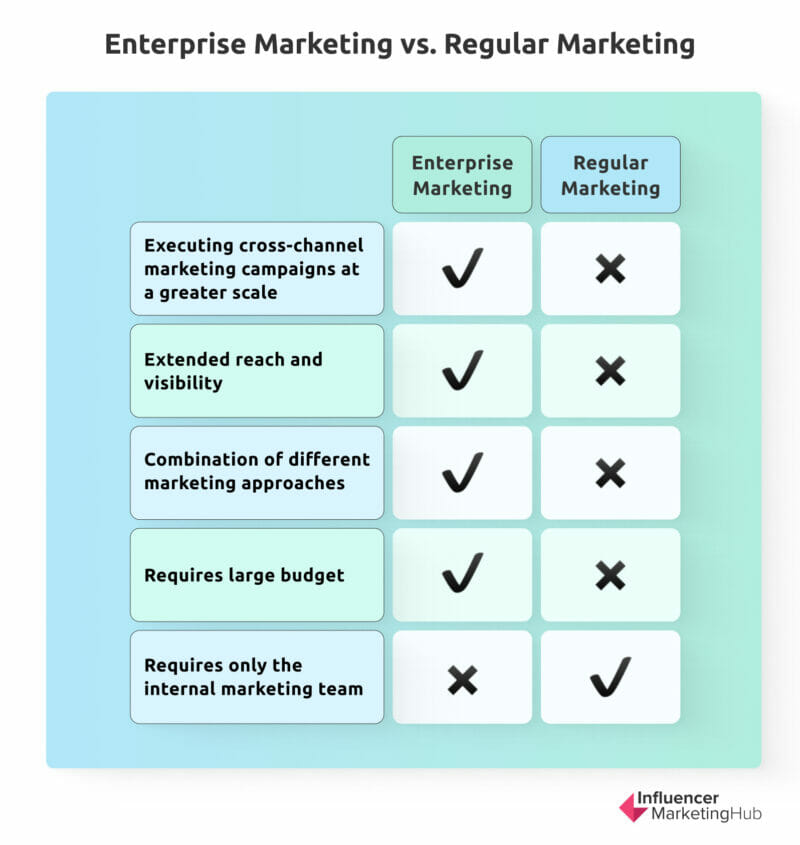
Simply put, enterprise marketing involves marketing at a grander scale than your typical marketing program. Most enterprises have a global presence, which means their teams are spread across the world.
For example, Samsung India launched the campaign mentioned above. Similarly, Samsung would have different campaigns in other parts of the world. On the other hand, regular businesses usually have a local or regional reach. Their marketing campaigns are smaller and more concentrated on the immediate target audience.
For example, Sunsilk, the popular hair care brand, launched its Hairventures campaign in Lebanon. The campaign included four films featuring regional influencers showing how a Sunsilk regimen empowers women to celebrate their individuality while remaining part of a sisterhood.

Sunsilk Hairvenutres
In India, the brand launched its campaign with the tagline, "Go out and make it happen for you as Life Can't Wait!" Again, the core message was to encourage young girls to live life to the fullest, but the execution was tailored to resonate with the Indian audience. Samsung worked with Priyanka Chopra, a popular Indian actress and global brand ambassador, for this campaign.
In the US, Sunsilk has worked with Madonna and Shakira in Super Bowl ads for similar campaigns in the past. Such a global reach and adaptability are what sets enterprise marketing apart from regular marketing.

Sunsilk adverts
On the other hand, Dae Hair, a local US brand based in Arizona, has a mid-sized Instagram following. Its marketing strategy does not involve expensive Super Bowl ads or celebrity endorsements. The brand doesn't have multiple global campaigns either.
Instead, it has a local presence and uses social media, influencers, and UGC marketing to reach its target audience.
Another difference between regular and enterprise marketing is the budget involved in the process. Enterprise marketing typically has a larger budget, as enterprises have more resources at their disposal.
On the contrary, regular businesses may have to work with a limited budget and need to be more strategic and focused in their marketing efforts.
More importantly, regular marketing only requires internal marketing teams. It is a self-contained process where the team has control over the entire marketing strategy and execution. However, enterprise marketing often requires collaboration with external digital marketing agencies or partners as enterprises have larger-scale operations and need specialized skills for their campaigns.
Differences Between Enterprise and Regular Marketing
- Enterprise marketing involves marketing on a global scale, with teams spread across different regions worldwide.
- Regular marketing is typically local or regional, with campaigns focused on a smaller, more concentrated target audience.
- Enterprise marketing manages multiple global campaigns, each tailored to resonate with regional audiences.
- Regular marketing focuses on local campaigns that primarily use social media, influencers, and user-generated content (UGC).
- Enterprise marketing operates with a larger budget due to more resources, allowing for expansive and high-cost campaigns.
- Regular marketing works with a limited budget, requiring strategic and focused marketing efforts.
- Enterprise marketing often involves collaboration with external digital marketing agencies or partners due to the large scale of operations and the need for specialized skills.
- Regular marketing is typically managed by internal marketing teams who control the entire strategy and execution process independently.
Most Commonly Used Enterprise Marketing Tools
Enterprise marketing often works hand-in-hand with specialized software designed to handle large-scale campaigns and broad-objective strategies. Here are the most common types of enterprise marketing tools:
- Customer Relationship Management (CRM) Systems: Tools like HubSpot and Agorapulse help organizations manage social interactions, track sales, and analyze social media data to improve relationships and drive sales.
- Email Marketing Software: Platforms such as Omnisend and Mailchimp allow enterprises to create, manage, and automate email campaigns, providing features for audience segmentation and performance analytics.
- Marketing Automation Tools: Tools like HubSpot and Marketo automate repetitive marketing tasks, allowing for more efficient lead nurturing and campaign management.
- Website Analytics and Reporting Tools: Google Analytics and similar platforms provide insights into website performance, user behavior, and campaign effectiveness, helping marketers make data-driven decisions.
- Social Media Management Tools: Brandwatch and Sprout Social help manage social media accounts, schedule posts, and analyze engagement metrics across multiple platforms.
- Online Reputation Management Software: Tools like ReviewTrackers enable organizations to monitor and manage their online reputation by analyzing customer feedback and reviews.
- Lead Nurturing Software: These tools help guide potential customers through the sales funnel by providing targeted content and communications based on their behavior and needs.
- Content Management Systems (CMS): Platforms like WordPress and Drupal allow enterprises to create, manage, and publish content efficiently, supporting their marketing strategies.
- Social Listening Tools: Tools like Brand24 help monitor social media conversations about a brand, helping organizations understand customer sentiment and engage with their audience effectively.
- Data Analytics and Business Intelligence Tools: Solutions like Tableau and Power BI provide advanced analytics capabilities, enabling enterprises to visualize data and gain insights for strategic decision-making.
Pro Tip
No doubt there's an abundance of tools available for each type of enterprise marketing software. So for simplicity's sake, why not use a tool like HubSpot that can do it all?
What Are the Challenges of Enterprise Marketing?
When creating marketing campaigns at an enterprise level, you may come across a lot of challenges along the way. After all, staying on the same page when your business operations are spread across multiple locations can be a daunting task.
It's also complicated to keep the bottom line in check when you have a larger budget. With more resources, there's a higher risk of overspending and not seeing the expected return on investment. Here's a closer look at some of these challenges and how to overcome them.

1. Improper Resource Allocation
Deloitte reports that businesses spend around 20% of their total budget on marketing. Ideally, a higher budget should mean better resource allocation.
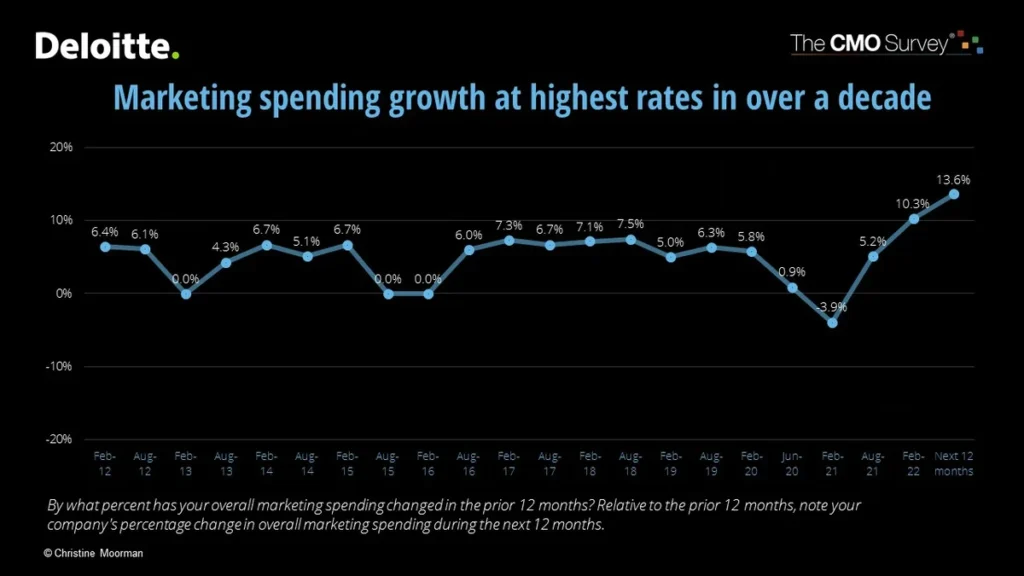
Source: blog.hubspot.com
However, in enterprises, this often leads to a lack of focus and direction. With more resources available, there's a tendency to spread them too thin across multiple campaigns, which can lead to disappointing marketing efforts.
Some channels and strategies may need a bigger investment than others to deliver the most effective results consistently. However, since there are too many channels to handle and strategies to perfect, decision-makers might end up with a suboptimal approach.
Solution:
Businesses need to constantly review existing strategies and budget allocations to ensure strategic resource distribution. Enterprises should have a biannual or annual review of their marketing efforts and budget to determine the most effective channels and strategies.
2. Lack of Collaboration
In enterprise marketing, different teams are required for successful execution. As a result, you may have different teams working on their own and having their own opinions and approaches. There's a chance that communication can become siloed, which would result in a lack of collaboration.
For example, the social media team might be working on a separate campaign from the webinar team, and they may not be communicating effectively. It's possible the email marketing team is going off on a different tangent altogether.
Such haphazard communication systems have two main outcomes. First, there's an increase in the risk of brand inconsistency as every team has its own perspective and vision for the company. Second, enterprise marketers have to deal with a waste of time, money, and resources on campaigns.
Solution:
The best way to avoid miscommunication is to employ the right marketing planning tools that will allow different departments to communicate with each other easily. Trello is one such tool, bringing all your teammates, tasks, and tools into a centralized platform. Even if an enterprise's teams are spread across the country or the world, they can collaborate in the same productivity powerhouse.
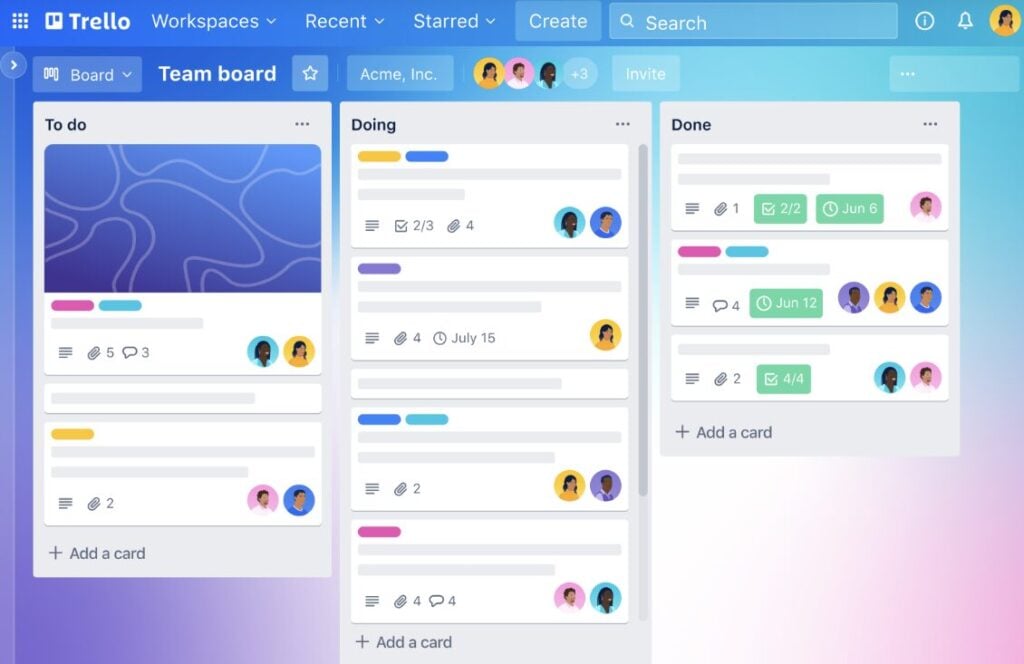
Source: trello.com
3. Difficulty With Program Management
With enterprise marketing programs operating at such a massive scale, it can be challenging to manage them effectively. If there's a lack of organization and structure in marketing campaigns, things can quickly spiral out of control, leading to confusion and chaos.
Also, teams are not always present in the same region, let alone in the same office. So, it can be hard to maintain transparency and ensure that everyone is on the same page.
The fact that enterprise marketers report vendor relationship management to be a barrier to expanding their market reach doesn't make things easier. It shows that even with a ton of helpful tools available, marketers struggle to manage the relationships and expectations with their vendor partners, which ultimately impacts the success of their marketing programs.
Solution:
The key is to find tools and vendors that can truly integrate with your existing systems and processes rather than just taking on more layers of complexity. From robust CRM platforms to email marketing tools to project management software, there are plenty of options out there. Opt for the reputed and reliable ones to avoid relationship management issues.
4 Leading Enterprise Marketing Strategies
By now, you must have a clear understanding of what enterprise marketing is and the challenges that come with it. It's time to learn about the specific strategies that can help you manage and execute your enterprise marketing campaigns.
Note that you don't necessarily have to implement all these strategies. Also, some strategies may work better for certain industries or businesses than others. Do your due diligence before selecting a strategy for your needs.
Personalization to Boost Inbound Marketing Results
Inbound marketing means attracting potential customers through relevant and valuable content rather than disrupting their activities with intrusive ads. It's a more customer-centric approach to marketing that has been proven to deliver better results.
According to Invesp CRO, inbound leads cost 61% less than their outbound counterparts. Also, businesses that use inbound marketing save $14 on every new customer they acquire.
One effective way to enhance your inbound marketing efforts is through personalization. It means creating content or email campaigns that are tailored to individual customers' interests and needs.
In a McKinsey report, 67% of customers said that they expect brands to give them relevant product and service recommendations, while 59% said that they would want brands to send them timely communications tied to their key moments.

Importance of personalization among customers
The point is that customers want you to go the extra mile by acknowledging their individual preferences and anticipating their needs.
Take Shopify as an example. The company knows that most of its users are small business owners who need all the help they can get. So, Shopify has written a series of articles that provide tips for small businesses and guide them in creating an online store.

Source: google.com
For your inbound marketing personalization to work, you also have to show prospects how your product solves their individual problems. That's what Shopify does in its guide on creating an online store. Besides providing relevant information, the company explains how its platform can help with each step of the process.
Personalization is not just limited to content. You can also use it in your website design, customer service interactions, and even product offerings. For example, Shopify offers a number of free tools for small businesses.

Shopify free small business tools
Word-Of-Mouth And User-Generated Content to Spread the Word
It’s a well-known fact that consumers trust other consumers. Of course, it’s only natural that you’d trust the claims coming from someone who’s just a regular consumer rather than from someone who’s trying to sell you the product. In fact, a whopping 42% of consumers read online reviews regularly to learn more about a local business.
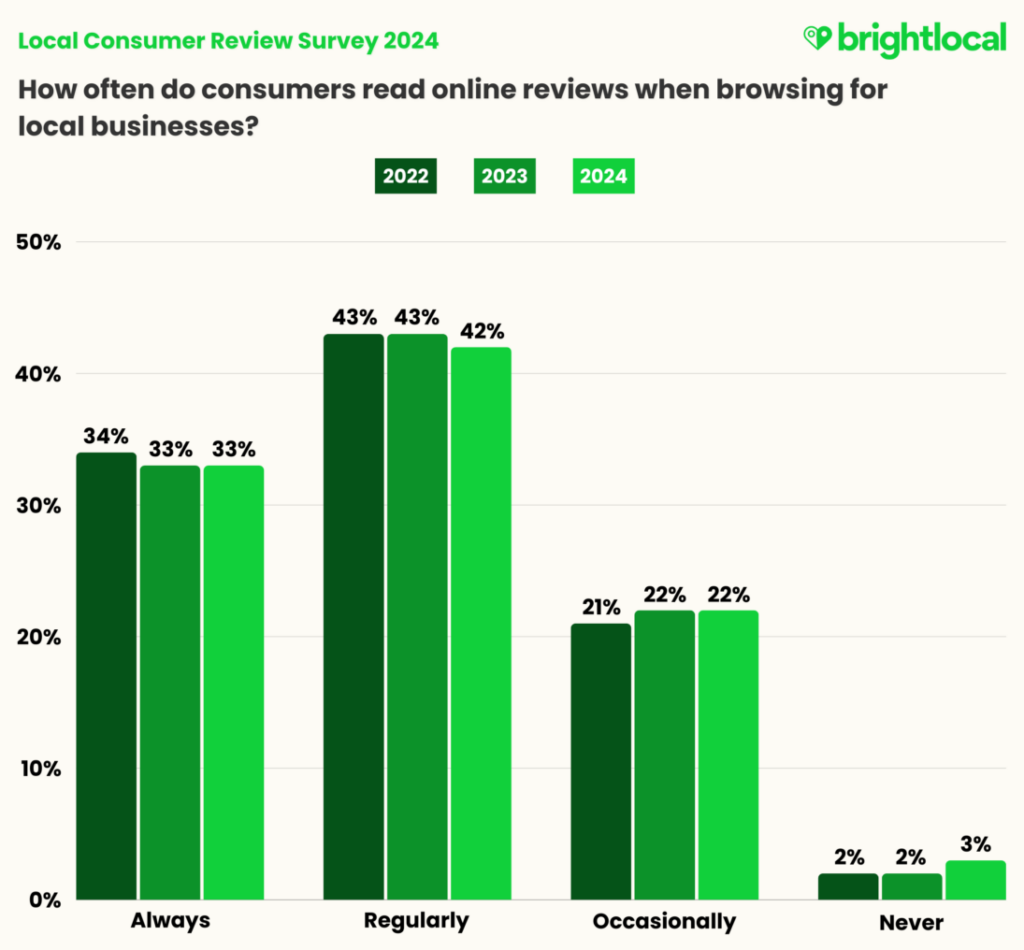
How many consumers read online reviews
That’s exactly why marketing tactics such as word-of-mouth and user-generated content should be a crucial part of your enterprise marketing program. The best way to set word-of-mouth marketing in action is to build a community of loyal customers. These customers will eventually become brand advocates and spread the word about your remarkable offerings and customer service.
A second option is to offer referral programs that encourage customers to promote your brand in exchange for rewards or discounts. For example, PayPal has a referral program in which existing users can earn $100 in cash back when they refer ten of their friends.

PayPal referral program
The reward doesn't necessarily have to be monetary. If your product is a digital one, you can offer an extended free trial or exclusive access to special features for users who successfully refer others. For example, Dropbox offers free storage for people who refer their friends to sign up for and use the service.

Dropbox referral program
As for marketing through user-generated content, it's as simple as encouraging your customers to share their experiences and opinions about your brand on social media or review websites. You can then share this content on your website or social media pages.
Discord is a good example of this. The company shares UGC on its Instagram page, which gets a ton of engagement.
UGC doesn't have to be super-professional; it simply has to be relatable enough for other potential customers to be interested in your brand. You can also create branded hashtags and encourage customers to use them when posting about your products or services.
Lead Scoring for Higher Conversions
As enterprise businesses struggle to identify how to best allocate their efforts and resources, lead scoring can be a godsend. Basically, you assign a point value to each lead based on the actions they take and the information they provide. Based on this score, you then prioritize which leads are most likely to convert and which ones need more nurturing.
Fortunately for businesses, the lead-scoring process has become much easier with automation tools that will score and rank your leads automatically. For instance, HubSpot's predictive lead-scoring software automatically takes cues from thousands of data points to prioritize leads. You can also customize the scoring system if you have specific criteria or data points that are more relevant to your business.

HubSpot’s lead scoring software
An AI-based alternative is Pecan AI, which uses machine learning to prioritize leads based on how likely they are to convert. Pecan also integrates with different data systems, such as Google, IBM, Salesforce, and Big Query. You can ask the model predictive questions to benefit from its AI technology.

Pecan AI predictive chat
Omnichannel Marketing for Higher Conversions
McKinsey surveyed roughly 3,500 business decision-makers in 12 markets and found that customers want omnichannel marketing, and they want it to be personalized. The same report also found that omnichannel marketing is more effective than the traditional single-channel sales model.
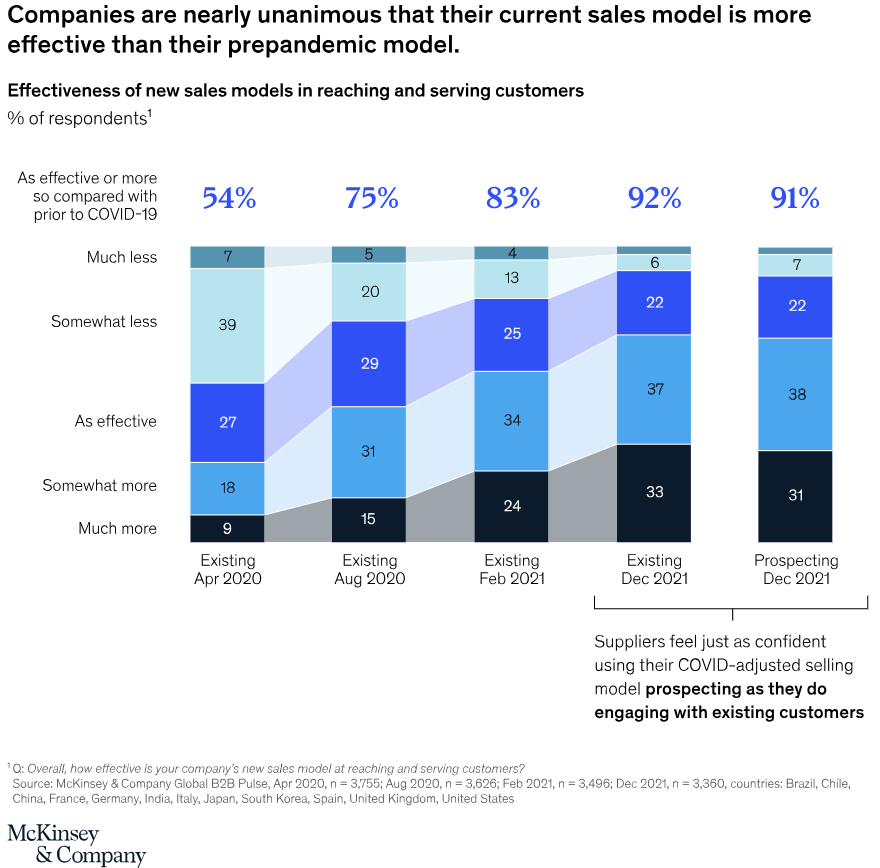
Confidence level with omnichannel marketing
Omnichannel marketing means being present on all channels and providing a seamless experience for the customer, whether they are browsing your website, reading an email, commenting on your social media post, or interacting with your chatbot. Simply put, you need to meet your customers where they are and provide personalized and consistent messaging across all channels.
One way to do this is to integrate your CRM with your marketing automation platform. It will help you track interactions across a multitude of channels. Don't forget about mobile experiences. With over half the world accessing the web on their phones, your website and email campaigns must be mobile-friendly.
We have a guide on Omnichannel Marketing Examples that you can take inspiration from.
Essential Enterprise Marketing Practices for Decision-Makers and Executives
Enterprise marketing requires strategic insight and effective leadership. Check out these best practices that outline essential practices tailored for decision-makers and executives, ensuring your marketing strategies align with overarching business objectives and drive impactful results.
Develop a Brand Voice and Maintain It Consistently
A big challenge for enterprises is maintaining a consistent brand voice across all channels, considering their large size and diverse teams. So, it's imperative to develop a unified brand voice that shows your company's personality and values. Make sure this voice is consistent across all campaigns and channels.
Microsoft has an informative yet approachable brand voice that they maintain consistently across their various social media platforms and marketing materials. For example, you'll find fun pop culture videos on their Instagram account. At the same time, they post webinars and infographics. The same tone is carried over to their TikTok account, too.
Deepen Market Penetration by Targeting International Markets
Some enterprises overlook the opportunity to expand into international markets with their marketing efforts, even if they have a global audience. They may use the same marketing strategy in all regions rather than catering to unique demographics.
However, if you want maximum impact, keep the local markets in mind. On your website, this could mean offering translated versions, ensuring local payment options are available, and creating localized content.
Similarly, for social media, you can have different handles for each country, but all are connected to the main brand account. Vogue does that exceptionally well.

Vogue country-wise accounts
You can also create different ads for each country. For example, if you want to run influencer marketing campaigns, work with local influencers for each region.
Map Your Expansion Goals
While your ultimate goal is definitely growth, you should describe what ''growth'' means for your company. Maybe you want to break into a new market segment or improve sales figures in your current markets.
Whatever your goals are, your company leaders and stakeholders should agree on and understand what they are. Also, communicate these goals to the rest of your team so that they base all strategies towards achieving them.
Use It With Account-Based Marketing
Account-based marketing, or ABM, means marketing to a specific account or client. For example, as a SaaS company, you might target a certain eCommerce company as your account.
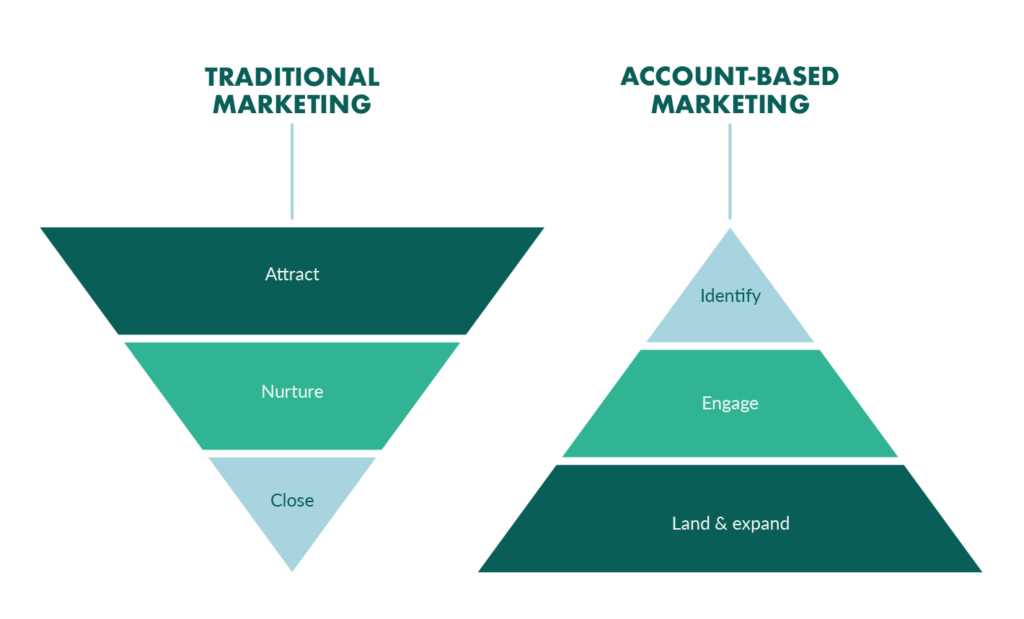
Account-based vs. traditional marketing
With this approach, the goal is to land a high-value account/client rather than numerous smaller ones. It puts all your resources into one basket to win the biggest possible client.
In the same vein, use account-specific key performance indicators (KPIs) to see the performance picture of different accounts rather than your strategy as a whole. These metrics will help you pinpoint exactly where improvements are in order. Some KPIs to measure include organic search growth, account penetration, customer lifetime value, account conversions, and sales per lead.
Wrapping Up
To sum up, enterprise marketing is a combination of traditional and digital marketing strategies implemented on an enterprise scale. It's not as simple as a team sitting in an office planning the next social media post. Instead, it's a nationwide or worldwide web of teams and strategies all working towards the same goals.
Enterprise marketers need to resolve the challenges we've discussed earlier. Plus, follow the leading strategies we've discussed in this guide and base your campaigns on the best practices we've talked about. With a well-rounded understanding of enterprise marketing, you can grow your business exponentially.
Frequently Asked Questions
What is meant by enterprise marketing?
Enterprise marketing refers to the combination of all the marketing strategies employed by an organization with the goal to achieve growth and expansion. See these marketing strategy examples to learn more.
How is enterprise marketing different?
Enterprise marketing involves marketing at a grander scale than your typical marketing program. It involves multi-channel approaches and multifaceted strategies powered by a much bigger budget and backed by a number of teams.
What is enterprise marketing platform?
An enterprise marketing platform is software that enables businesses to unify how they manage marketing strategies across different channels. It is used for campaign management, resource allocation, collaboration, customer experience management, and analytics.
What are enterprise marketers?
Enterprise marketers are marketers who specialize in enterprise marketing strategies.
What are the functions of enterprise marketing management?
Some of the key functions of enterprise marketing management include campaign management across all your marketing channels, resource management, customer experience management, and campaign analytics.
What are the benefits of enterprise marketing?
The benefits of enterprise marketing include increased brand visibility, high lead generation potential, improved customer relationships, enhanced brand reputation, and stronger market position. Unlike regular marketing, enterprise marketing achieves all these benefits on a larger, global scope.
What are the challenges of enterprise marketing?
Some challenges faced by enterprise marketers include aligning teams and strategies, managing large amounts of data, coordinating multiple campaigns, balancing global and local goals, and understanding diverse target markets.
What are the main objectives of enterprise marketing?
The primary objectives include lead generation, brand awareness, customer engagement, and revenue growth, all executed through coordinated marketing strategies across various channels.
What is an enterprise marketing strategy?
An enterprise marketing strategy is a structured plan that outlines how a large organization will achieve its marketing goals, focusing on cross-departmental collaboration and integrated campaigns to drive growth and customer retention.


